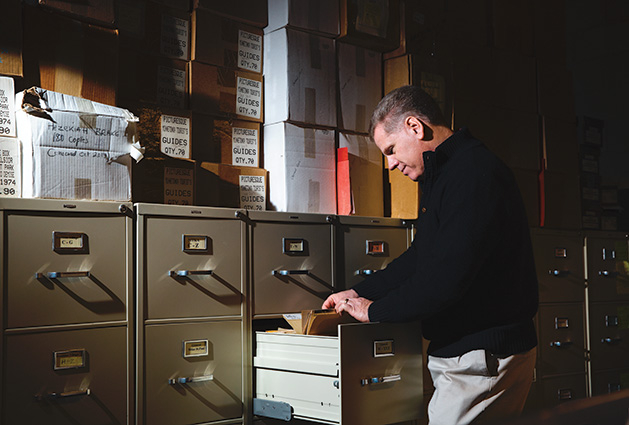
At age 12, Scott McGinnis read a biography about Winston Churchill that kickstarted his path as a historian.
“His life was so amazing,” McGinnis says of Churchill. “The stories, you know, his escape during the Boer War in Africa and the whole battle for Britain and World War II … It just captivated me, and that’s what hooked me on history.”
Long before that moment, McGinnis’ personal history with the Lake Minnetonka area began back in 1856, when his ancestors moved south of Excelsior. His family includes seven generations buried in Chanhassen Pioneer Cemetery, he says.
With an interest in family and local history, he started going to the Minnesota Historical Society (MHS) to do research in their library archives at age 15. He started working there at 18 when he began college at the University of Minnesota, where he got his degree in history. He worked at MHS for almost nine years. “I was working 35 hours a week throughout my college years,” he says.
At the society, he met his mentor, who encouraged him to go out and work as an independent contractor. About 70 percent of the work he did was with environmental engineering companies, but he also worked with environmental attorneys. “I worked with [attorneys] on cost recovery cases—these were heavily contaminated sites or Superfund sites,” he says.
His job was to find out what the contamination was, how much of it existed, who the suppliers were and any other information he could gather. He worked both sides of it. “If they were the defendant and I found damning evidence, they’d want to settle this case quicker before the other side, the plaintiff, found this information,” McGinnis says. “And if it was the plaintiff’s side, they’d want to press even harder and get more money.”
Several years ago, he stepped back from his work to take care of his father-in-law, who'd had a stroke. Now, McGinnis is “sort of” retired, he says. He still finds himself deeply involved in all things lake-history-related. He volunteers at the Excelsior-Lake Minnetonka Historical Society (ELMHS), where he has developed programs and given presentations.
He has also written a few books, including Excelsior's Waterfront: the History of the Excelsior Commons and Excelsior Docks. In the future, he hopes to write a book on Lake Minnetonka’s hotel and tourist industry of yore.
History is important, because it explains our environment today and helps us avoid repeating mistakes, McGinnis says. He gives the example of the historic fruit growers’ building being demolished on Excelsior’s Third Street. “They started digging up the foundation and came across what environmentalists call free product,” he says. “There was all of this gasoline and petroleum product in liquid form. If they had known about that beforehand, they probably would’ve been more careful in the demolition and with things like cigarettes,” he says. “Fortunately, there weren’t any accidents like that.”
When it comes to history, McGinnis says, consider the context. “People don’t think about how people thought in 1850,” he says. “They use today’s standards and judge people who were living 100 to 150 years ago,” he says. “It really isn’t fair, because societal norms and expectations have changed during that time.”
On the Trail
Check out some of Scott McGinnis’ favorite local historic sites.
Kalorama Cottage
This cottage was one of the premier boarding houses on Lake Minnetonka. “It’s one of the last touchstones for the apex of the Lake Minnetonka tourist industry,” McGinnis says.
Steamboat Minnehaha
“There’s really no other way to explain steamboat transportation than to put somebody on a steamboat and let them experience it,” McGinnis says.
Western Hennepin County Pioneer Association Museum
McGinnis enjoys this historic site in particular, because it used to be a school.









